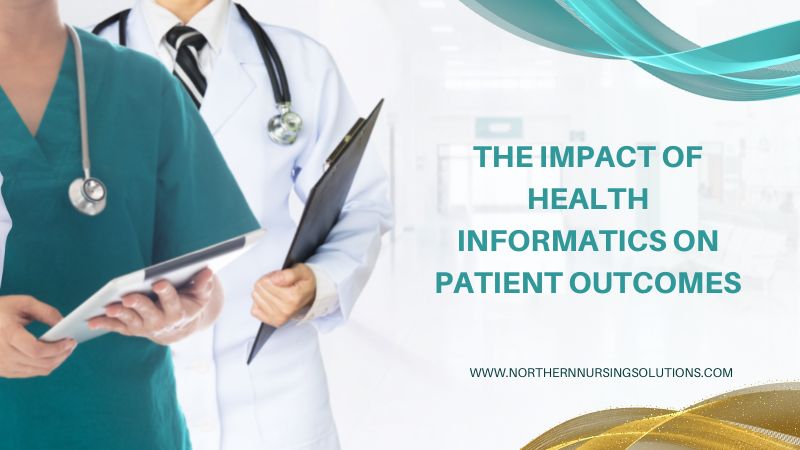Within the context of the quickly changing world we live in today, the significance of technology in enhancing the results for patients cannot be emphasized. The area of healthcare informatics, which focuses on the successful and efficient utilization of data in order to improve the quality of care provided to patients, has completely altered the landscape of the medical sector.
An investigation that was published in the Journal of the American Medical Informatics Association found that the utilization of health informatics has the potential to decrease the rates of death among inpatients by as much as fifteen percent. Furthermore, those facilities that make use of health informatics tools have shown a reduction of 25 percent in the length of time that patients have to remain in the facility, as well as a reduction of 19 percent in the risk that patients would be readmitted within the next 30 days.
This article provides an overview of the role that health informatics plays in the healthcare sector, the numerous ways in which it enhances patient care, and the ways in which you may harness this knowledge to become a successful leader in the field. If you are interested in having an influence on the overall health of patients, read on.
4 Ways Health Informatics Improves Patient Care
Decreases the Number of Errors in Health Data

A significant contribution to the reduction of inaccuracies in health data is made by health informatics. By automating the processes of data collection and analysis, health informatics systems lower the likelihood of mistakes occurring in a variety of elements of healthcare that are more prone to errors. These aspects include the following:
- Requests for prescriptions
- Information on health insurance
- The diagnostic process
- The input and transcribing of health data
In addition, these systems offer doctors feedback in real time, which serves to alert them to any potential medical mistakes or anomalies in the data pertaining to patients. Electronic health records, often known as EHRs, give doctors the ability to quickly and easily access the medical histories of their patients. This can facilitate the reduction of the need for repeated testing, the improvement of diagnostic accuracy, and the avoidance of unneeded and expensive medical treatments.
Also Read:- Strategies For Managing Healthcare Workers Stress
Increases Efficiency and Coordination
The efficiency that it provides for administrative chores, including as appointment scheduling and invoicing, is one of the most significant advantages of health informatics. This efficiency frees up more time for providing better patient care. In spite of the fact that this may appear to be an advantage for larger medical institutions, health informatics plays an essential part in the efficiency and coordination of both community clinics and large university health centers.Community clinics have the potential to improve their capabilities by introducing health informatics enabled systems, such as electronic health records (EHRs) and other forms of health information technology (HIT).
- Record the medical histories of patients.
- Keeping an eye on treatment plans
- Conversations with other medical professionals are encouraged.
According to Spitulnik, “it is highly unlikely that a community hospital in the immediate area will have interdisciplinary interaction on the same scale as a university medical center.” Therefore, as a result of the growth of electronic records, it is now much simpler for community hospital practitioners to have access to significant volumes of vital health information, which can have a significant impact on the diagnosis and treatment of a patient.
Boost Patient Engagement

Despite the fact that practitioners play a significant part in determining the results for patients, health informatics has shown that patients also play a role in this process. It has been demonstrated via a significant amount of research that increased levels of patient participation lead to improved results for patients, as stated by Spitulnik. “And one of the things that informatics does is enhance the patients’ ability to get involved in their own health through patient portals,” the author writes.
Patient portals keep track of a variety of vital information, including the following examples:
- Records of medical care
- The results of the tests
- A medical history of the family
- Notes about the appointment
Patients can be empowered to take a more active part in their overall health by having access to this publicly available data, which can assist improve openness in the healthcare industry. Seventy percent of patients who utilize a patient portal report feeling better connected with their healthcare provider, as indicated by a poll that was carried out by the Office of the National Coordinator for Health Information Technology for the purpose of gathering information.
Additionally, patients have the ability to use patient portals to book appointments, seek medication refills, and send secure communications to their healthcare practitioner. This can increase communication and overall satisfaction with the treatment that they get. Patient portals are an important health informatics tool that may enhance outcomes and boost patient participation. This is especially true in light of the rising trend toward patient-centered treatment.
Improves Decision-Making

The process of making decisions in the healthcare industry is a complicated one that entails a variety of obstacles, one of which is the interpretation and analysis of the tremendous volumes of data that are currently available to practitioners. “There are billions of bytes of information that are available,” says Spitulnik. “This contains data about you personally as well as data about everyone else in the globe.”
Spitulnik continues by saying, “For instance, informatics provides the tools that healthcare providers require in order to access diagnosis and treatment data of anyone who has the same or similar conditions in order to assist them in making clinical decisions regarding the treatment of a patient.”
In addition, health informatics offers real-time data analysis and predictive modeling, both of which may significantly contribute to the process of administrative decision-making inside a healthcare facility. In addition to providing clinical data, information on demographics is also provided by the field of informatics, according to Spitulnik.
Also Read:- Ways To Improve Healthcare Staff Communication
Conclusion
In conclusion, by decreasing medication mistakes, decreasing adverse drug responses, and enhancing adherence to practice guidelines, health information technology enhances patient safety. Undoubtedly, health information technology plays a significant role in enhancing the quality and safety of healthcare. However, healthcare institutions must exercise caution when deciding which technologies to invest in, as research indicates that certain technologies may not have a strong enough correlation with better patient safety outcomes.
FAQs
How does health care informatics impact patient outcomes?
Reducing mistakes in health data is largely dependent on health informatics. Prescription orders are one area of healthcare that is more prone to mistakes. Health informatics solutions lower this risk by automating data gathering and analysis procedures. Details about health insurance
How does EHR improve patient outcomes?
Better judgments and care will be able to be made by providers thanks to the data’s timely availability. The EHR, for instance, can enhance patient care by: Lowering the frequency of medical errors by enhancing the precision and legibility of medical records.



